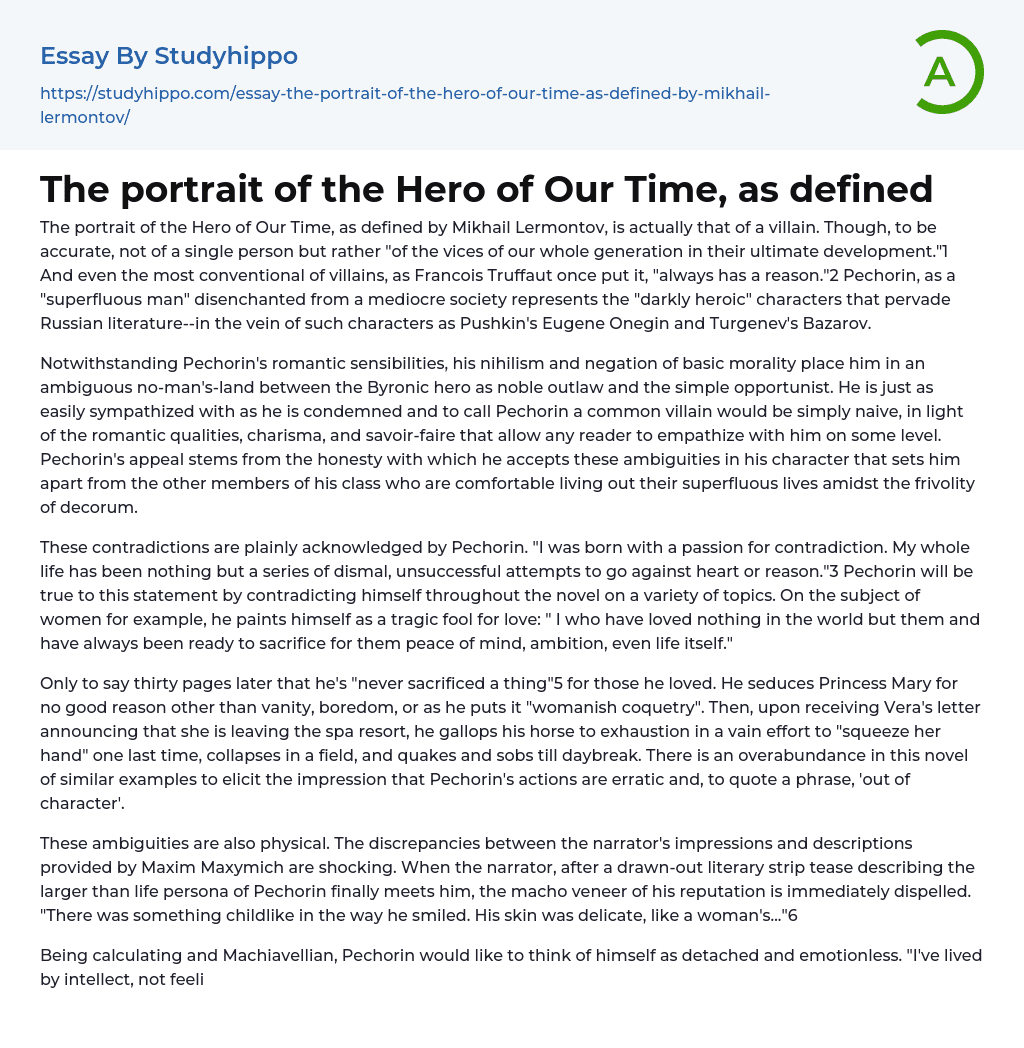

The portrait of the Hero of Our Time, as defined Essay Example
According to Mikhail Lermontov, the portrayal of the Hero of Our Time is essentially that of a villain. However, it is important to note that this depiction does not refer to an individual person but instead represents the flaws and faults present in our entire generation, taken to their extreme. As Francois Truffaut once noted, even traditional villains have reasons for their actions. Pechorin, who embodies the archetype of the "superfluous man" disillusioned with a mediocre society, exemplifies the presence of "darkly heroic" characters found throughout Russian literature. Other examples include Pushkin's Eugene Onegin and Turgenev's Bazarov.
Despite Pechorin's romanticism, his nihilistic beliefs and rejection of basic morality leave him in a precarious position between being a noble outlaw like the Byronic hero and a mere opportunist. He can be both sympathized with and condemned, a
...nd labeling him as a typical villain would be naive. This is due to his romantic qualities, charm, and sophistication that allow readers to connect with him on some level. Pechorin's appeal lies in his ability to acknowledge and embrace these uncertainties within his character, which distinguishes him from the others in his social class who comfortably live superfluous lives amidst superficial conventions.
Pechorin openly acknowledges these contradictions. "I was born with a passion for contradiction. My whole life has been nothing but a series of dismal, unsuccessful attempts to go against heart or reason."3 Throughout the novel, Pechorin contradicts himself on various topics. Regarding women, he presents himself as a tragic fool for love: "I who have loved nothing in the world but them and have always been ready to sacrifice for them peace of mind, ambition, even life itself." However
just thirty pages later, he claims to have "never sacrificed a thing"5 for those he loved. He seduces Princess Mary out of vanity, boredom, or as he describes it, "womanish coquetry". Yet, upon receiving Vera's letter announcing her departure from the spa resort, he races his horse until exhaustion in a futile attempt to "squeeze her hand" one last time. He then collapses in a field and trembles and weeps until daybreak. There are many similar examples in this novel that contribute to the impression that Pechorin's actions are unpredictable and, to put it simply, 'out of character'.
These physical ambiguities are also evident in the descriptions of Pechorin. The narrator's impressions clash with Maxim Maxymich's descriptions, which is quite surprising. When the narrator finally meets Pechorin after a long-winded description of his larger than life personality, the tough image he projected is immediately shattered. "There was something childlike in the way he smiled. His skin was delicate, like a woman's..."6
Pechorin, who prides himself on being calculating and Machiavellian, wants to believe he is detached and devoid of emotions. "I've lived by intellect, not feeling. I weigh and analyze my emotions and actions with close interests, but complete detachment. There are two men within me - one lives in the full sense of the word, the other reflects and judges him."7 However, upon reading his journal, it becomes clear that he is making an effort to appear this way. Yes, he is deceitful but not entirely lacking compassion. He loves Vera despite mistreating her - he even admits to feeling "sorry" for her at one point. In line with Romanticism, he has a poetic connection to
nature - valuing its purity over the corruption of civilization.
The text describes Kislovodsk and its beauty, with vivid imagery of lime walks, foaming waterfalls, green-clad hills, misty ravines, scented air, grasses, and icy streams. The protagonist, Pechorin, is a misunderstood character who is unsure of his own identity. He tries to portray himself as a calculating "vampire" but fails as his emotions get the best of him. In the chapter, the Fatalist, Pechorin criticizes the idea of predestination without offering an alternative. He feels like a cosmic orphan and his dark Byronism pushes him to extremes beyond the idealism of Romanticism.
"Questioning everything is my choice. This mindset doesn't weaken me; instead, it enhances my fearlessness in the face of uncertainty. Personally, I gain more confidence from being unaware of what lies ahead."11 In summary, despite Pechorin's vanity, laziness, and arrogance, he is not a coward; that's what makes him appealing. Despite contradicting himself and acknowledging his nonconformity, he accepts his flaws without regret. He is authentic. In a world dominated by moral and political hypocrisy, his attitude must have been viewed as refreshing. In this aspect, he emerges as a hero.
- Leader essays
- Biography essays
- Power essays
- Superhero essays
- Mission essays
- Purpose essays
- Helping Others essays
- Actions essays
- Book Summary essays
- Metaphor essays
- Reader essays
- Rhyme essays
- Literary devices essays
- Villain essays
- Books essays
- Genre essays
- Literary Criticism essays
- Writer essays
- Protagonist essays
- Simile essays
- Poem essays
- Book Report essays
- Book Review essays
- Greek Mythology essays
- Plot essays
- Tragic Hero essays
- Coming of Age essays
- Play essays
- Rhetoric essays
- Rhetorical Question essays
- Translation essays
- Understanding essays
- Reason essays
- Character essays
- Letter essays
- American Literature essays
- Literature Review essays
- Utopia essays
- Poetry Analysis essays
- Dante's Inferno essays
- Between The World and Me essays
- Incidents in The Life of a Slave Girl essays
- Flowers for Algernon essays
- Myth essays
- Everyday Use essays
- Boo Radley essays
- Genesis essays
- Richard iii essays
- Alice in Wonderland essays
- On the road essays



